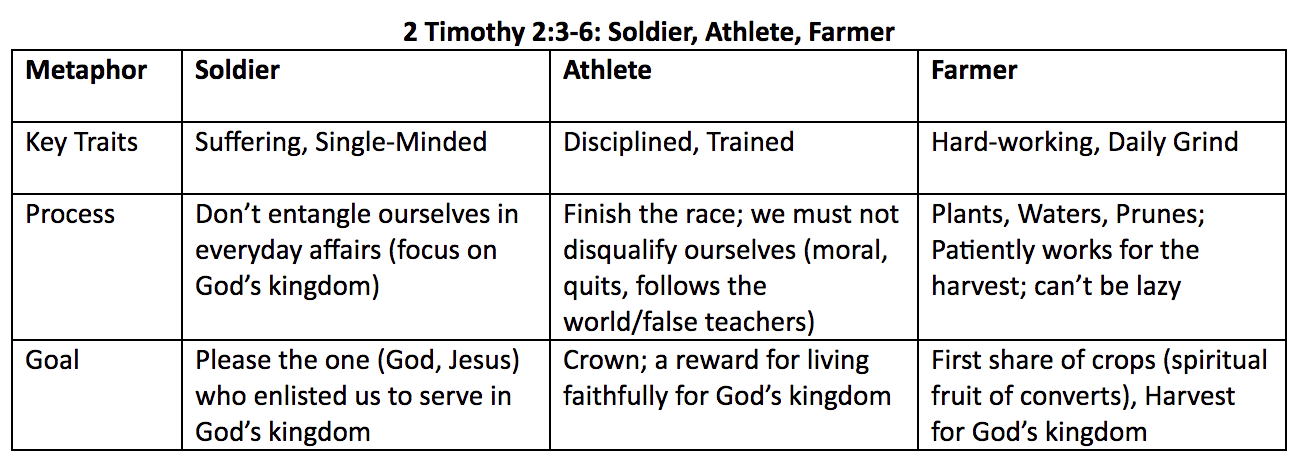
Week 3 (09/29/19)
2 Timothy 2:1-7
Theme: Transformed Disciples Focus on the Kingdom
Outline:
Spiritual Multiplication (2:1-2)
Single-Minded Soldier (2:3-4)
Disciplined Athlete (2:5)
Hard-working Farmer (2:6)
Reflection (2:7)
2:1-2: Paul’s love for Timothy is expressed in addressing him as “my child.” Paul highlights God’s grace because it’s the foundation for strengthening soldiers, athletes, and farmers for God’s kingdom (2:3-7). From a salvation standpoint, disciples must understand that they are saved by grace.
We become transformed disciples when we experience grace to the point that it overcomes our natural tendencies to pursue perfectionism, seek approval through serving, “beat ourselves up” when we don’t reach a perfect standard, and judge others for falling short.
Not only does God transform us with His grace (see notes on 1:2), but He also strengthens us with grace in the midst of our brokenness, challenges, and trial (2 Corinthians 12:9). God’s grace strengthens and empowers us to persevere.
What did Timothy hear from Paul “in the presence of many witnesses?” Timothy “heard” the gospel and “sound words” (doctrine) from Paul’s preaching and teaching. Timothy is exhorted to not only guard the deposit (1:14), but he is to “entrust” this deposit to those who are faithful.
Stott (51) notes the four generations of transformed discipleship: (1) Jesus to Paul, (2) Paul to Timothy, (3) Timothy to “faithful men” and (4) faithful men to “others.” Although the emphasis in 2:2 is equipping people for teaching the gospel and sound doctrine, we can also understand 2:2 in the context of transformed discipleship. In short, 2:2 is a prime example of spiritual multiplication.
Paul spiritually invested in other disciples. For example, let’s say that Paul discipled two more disciples (a total of three including Timothy). And these three in turn discipled two others and these two discipled two others, etc. By the time you reach the fourth generation, Paul’s initial discipleship of three would have spiritually multiplied into twenty-seven transformed disciples.
So, what are you waiting for? Do you have a Timothy in your life? Who is your Paul? Transformed disciples focus on God’s kingdom. Transformed disciples invest in spiritual multiplication.
2:3-4: Transformed disciples focus on God’s kingdom. But what do we mean when we refer to the kingdom of God or God’s kingdom? The kingdom of God refers to God’s rule. It has a literal and spiritual meaning. Literally, it’s God ruling on earth. We catch a glimpse (a very imperfect kingdom) of this with God ruling through the nation of Israel, especially its kings (Saul, David, Solomon).
In the future when Jesus returns, he will literally rule on earth (millennial kingdom: a thousand years or a long period of time; cf. Revelation 20:1-6) with perfect and complete peace, justice, and righteousness.
Spiritually, the idea of God’s kingdom refers to Jesus reigning in our hearts and related to the preaching of the gospel, forgiveness of sins, God’s power of delivering us from our sins, victory in spiritual warfare, and spiritual renewal.
In order to help us understand the kind of commitment necessary for expanding God’s kingdom, Paul used three metaphors (soldier, athlete, farmer). What’s the relationship between a soldier, athlete, farmer and God’s kingdom? Let me share three observations about each metaphor.
First, single-minded soldiers suffer with other Christians (2:3). Christ suffered. Paul suffered. All the disciples but John were martyrs. “Indeed, all who desire to live a godly life in Christ Jesus will be persecuted” (2 Timothy 3:12).
Second, single-minded soldiers don’t become “entangled in civilian pursuits” (2:4). This doesn’t mean that a soldier of Christ can’t be married, have children, or work in a non-vocational ministry career. Rather, Paul we can’t allow the things of the world to take our focus away from expanding God’s kingdom (Colossians 3:2; cf. John 17:14-15; 2 Timothy 2:14-3:9).
Third, single-minded soldiers seek to “please the one who enlisted him” (2:4). Like Paul at the end of his life, Christians want to be able to declare, “I have fought the good fight, I have finished the race, I have kept the faith” (2 Timothy 4:7).
Single-minded soldier are good stewards—they invest in and multiply God’s kingdom (generosity, natural talents, spiritual gifts, finances, gospel proclamation, disciple-making, sacrificial living) and look forward to hearing their commanding officer proclaim, “Well done, good and faithful servant” (Matthew 25:21, 23).
2:5: Paul’s second metaphor is an athlete. First, a disciplined athlete “competes according to the rules.” Kelly provides an example of training according to the rules: “competitors at the Olympic Games had to swear an oath before the statue of Zeus that they had been in strict training for 10 months” (176). Thus, training is absolutely necessary to further God’s kingdom.
Second, a disciplined athlete will not disqualify himself/herself from the races. How do we disqualify ourselves from the race (Christian ministry)? We disqualify ourselves if we fail morally/ethically, can’t finish the race (health related: due to a lack of discipline), or fall away from the faith (follow the world, follow false teachers).
Third, a disciplined athlete receives a prize (crown) if they excel in their competition. The Scriptures mention different kinds of rewards/crowns including an imperishable wreath (1 Corinthians 9:25), crown of boasting (1 Thessalonians 2:19), crown of righteousness (2 Timothy 4:8), crown of life (James 1:12), and crown of glory (1 Peter 5:4).
2:6: The third metaphor used is a hard-working farmer. First, the hard-working farmer lives in a context “totally devoid of excitement, remote from all glamour of peril [soldier] and applause [athlete]” (Stott, 56; citing Moule, The Second Epistle to Timothy, 77). In short, being a farmer for God’s kingdom can be mundane—it’s a daily grind and calling to consistently toil every day.
Second, the hard-working farmer should receive “the first share of the crops.” While some view this as a reference to Timothy receiving some kind of renumeration for his services (1 Corinthians 9:10-12; 1 Timothy 5:17-18), it’s best to interpret this as Timothy’s future reward in heaven or the present spiritual fruit of his converts (preference for the latter).
Third, the hard-working farmer focuses on the harvest. While the emphasis is on “the first share of the crops” it goes without saying that farmers toiled, labored, and sweated for the future harvest. Likewise, spiritual farmers work hard in planting gospel seeds in the lives of family members and friends.
2:7: Paul wanted Timothy to reflect (“Think over what I say”) on the things that he just wrote: grace strengthens us, spiritually invest and multiply our lives, focus on God’s kingdom like a soldier, athlete, and farmer. What’s the importance of each metaphor? (see chart above) We are to ask God to “give [us] understanding in everything” (cf. James 1:5-1:8).
Back
Reflection
1. Read the notes on the kingdom of God (see study guide). To what extent have you been building/expanding God’s kingdom? Share.
2. Transformed disciples grow in God’s grace. How are we strengthened by God’s grace?
3. How does 2:1-2 support the idea of discipleship. How does making disciples build/expand God’s kingdom?
4. Why do you think Paul used these three metaphors (soldier, athlete, farmer) to explain transformed discipleship?
5. How do the respective traits of a soldier, athlete, and farmer contribute to the idea of building/expanding God’s kingdom?
6. Action: Make a commitment to focus on God’s kingdom (see study guide). Choose to live like a solider, athlete, or farmer this week/month. What kind of changes do you need to make? How can living like a soldier, athlete, or farmer impact God’s kingdom?

